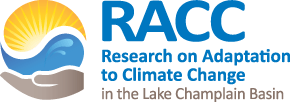Mediated Modeling Workshop
For invited guests.
October 26th, 2015
Davis Center, University of Vermont, Burlington, VT
8:30 a.m. - 5:00 p.m.
A day long workshop linking science, planning and policy
Workshop Overview
|
Workshop Summary: Adaptation to Climate Change in the Lake Champlain Basin: Generating Integrated Assessment Modeling Scenarios from the Interaction of Climate Change, Land-Use Change, Hydrology and Lake Biogeochemistry Workshop Overview: While the recent focus on Vermont's Total Maximum Daily Load (TMDL) plan has brought attention to a variety of planning, policy and engineering strategies to mitigate the nutrient loads in the Lake Champlain Basin (LCB), the ultimate success of these revised policies in mitigating the phosphorus concentrations and harmful algae blooms (HAB) likelihood in segments of Lake Champlain, is also contingent upon the likelihood of worst-case climate change scenarios during the remainder of the 21st century. Foremost among those strategies to simulate these potential scenarios, is the use of calibrated computer simulation models of watershed dynamics. For the LCB, such models have been used to determine TMDL levels, and to identify best management practices. In this workshop, these and a new integrated assessment model (IAM) being developed by researchers from the Research on Adaptation to Climate Change Project, will serve as a focus on the current state of using these and other models for adaptive management purposes. Workshop participants will include planners, scientists and policy makers with roles to play in the utilization of models and other sources of scientific data to anticipate hydrological; terrestrial; human-behavioral and societal-responses to climate change; economic dynamics; zoning and regulatory responses; and market incentive systems. The workshop will be divided into three segments:
Parking, a light breakfast, refreshments and lunch will be provided. There is no charge. This workshop is by invitation. If you wish to designate someone else to take your place, please have them register directly. If you have other people to suggest to be invited to the workshop, please let us know and we will extend an invitation if there is space available. For more information regarding the event please contact: Christopher Koliba at ckoliba@uvm.edu; 802-656-3772 or Sarah Coleman at scoleman@uvm.edu |
